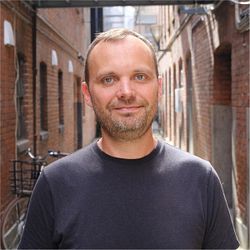Nyhed -
Lysa John, CIVICUS: A critical time to step in and intentionally support civil society
Lysa John, Secretary-General of CIVICUS - World Alliance for Citizen Participation, spoke at an CISU-event on May 10 2022 in Demokrati Garage.
Among others, the Danish Minister for Development Cooperation, Flemming Møller Mortensen, participated and listened to civil society's input to a debate about the Minister's statement about Denmark's strategy for development cooperation, 'The World We Share', prior to a debate in the Danish Parliament on May 11.
In this opinion piece, Lysa John shares her most important messages for the Minister:
Progressive states such as Denmark can play an important role in reinforcing the importance of civil society worldwide. This is a critical time to step in more intentionally and support civil society through long-term policies, investments and mechanisms that are co-created and co-owned with a diverse range of civil society actors. You can raise the bar on the norms, narratives and investments that will help stimulate larger segments of trust and support towards civil society from a wide range of state and non-state actors.
CIVICUS has with interest read the status report on the Danish strategy for development cooperation with a view to where we find challenges for civil society globally.
In order to respond to the increasingly complex challenges that we face across the world our societies need greater dialogue and co-creation of ideas and solutions across sectors. Civil society plays a crucial role in ensuring the effective operation of our societies through its many roles, including ensuring accountability and scrutiny of our institutions and safeguarding populations against governance abuses and rights violations. No other sector in the world continues to do as much with so little, and in the face of ever increasing restrictions and grave risks to their personal safety.
Unfortunately, since the onset of the COVID-19 pandemic we have seen an increasing number of governments blatantly abuse their emergency powers to suppress fundamental civic freedoms – the freedom of expression, the freedom of association and the freedom of peaceful assembly. There has been an increase in restrictive laws and a concerning use of propaganda and censorship by authoritarian governments. Too many activists are facing legal persecution and imprisonment for speaking truth to power. Data from the CIVICUS Monitor shows only 3.1% of the world’s population lives in countries where civic space is rated as ‘open’. That is, in countries that enable and safeguard the enjoyment of civic space for all people. Conversely, nearly 2 billion people live in countries rated ‘closed’ - where people live in constant fear of imprisonment or violence for exercising their fundamental rights.
Civic space restrictions have had a devastating impact on civil society’s ability to organise against human rights violations and hold state and market institutions accountable for the abuse of power. Russia’s brutal invasion of Ukraine and the international community’s response to it have shown that there is a clear link between authoritarianism that causes human suffering and the existence of enabled civic space and vibrant civil societies underpinned by respectful government-civil society relations. Authoritarian leaders are able to take unilateral action by suppressing dissent at home and causing suffering abroad. This only underlines the urge to donors like Denmark from the global civil society to stay focused, rather than shifting focus based on Danish national interests. Rapid shifts in focus from donors only supports the powers that dismantle civil society and the fighters for democracy and human rights.
By publicly condemning our work as illegal, unconstitutional or as acts of foreign intervention, governments have not only introduced formal mechanisms to curtail civil society’s important work but also set the stage for incidents of the harassment, intimidation and arrest of activists by other actors. We continue to see whistle-blowers and human rights defenders arrested and attacked with impunity around the world including in Zimbabwe, Poland and Mexico, even as sections of civil society have been banned by governments in Uganda and Tanzania. Even established democracies like Spain and the UK have attempted to revise laws in order restrict the right to expression and peaceful assembly during the pandemic.
Civic space restrictions have also had a disastrous effect on civil society’s ability to mobilise the tools and resources it needs to challenge structural inequalities and catalyse transformative change. Policies that prevent civil society from accessing international resources, introduced in countries like El Salvador and India, render local civil society who are on the frontlines of social transformation, incapable of securing the resources they have historically relied on. Left unchecked, this situation poses a risk to the survival and autonomy of important parts of the sector, with devastating long-term consequences for our societies and democratic values.
Globally, it includes the defence and application of international norms for human rights and fundamental freedoms, with a view to enabling civil society to grow with a focus on resilience, innovation and long-term sustainability. For international donors it also involves shifting from a saviour mindset to a solidarity mindset and to more trust-based and inclusive relationships and funding. Accessing resources should not restrict the causes and agendas of groups and movements.
By strengthening civil society’s support infrastructure, governments are ultimately securing mechanisms, enablers and spaces that they themselves need to work with and for the societies they serve. When civil society is relevant and resilient, societies can count on arenas for participation, exchange, confrontation and solidarity needed to face the big challenges and transformations ahead of us.
Lysa John is Secretary-General of CIVICUS. Headquartered in South Africa, CIVICUS is a global alliance of civil society organisations and activists dedicated to strengthening citizen action and civil society. The alliance has over 12,000 members located across 175 countries.
